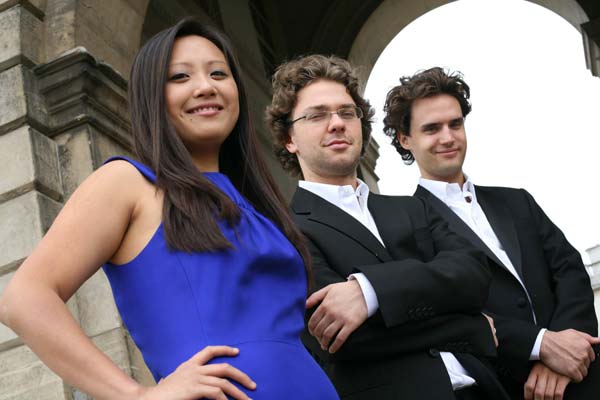
 'Taken 2' grabs movie box office crown
'Taken 2' grabs movie box office crown
 Rihanna's 'Diamonds' tops UK pop chart
Rihanna's 'Diamonds' tops UK pop chart
 Fans get look at vintage Rolling Stones
Fans get look at vintage Rolling Stones
 Celebrities attend Power of Women event
Celebrities attend Power of Women event
 Ang Lee breaks 'every rule' to make unlikely new Life of Pi film
Ang Lee breaks 'every rule' to make unlikely new Life of Pi film
 Rihanna almost thrown out of nightclub
Rihanna almost thrown out of nightclub
 'Dark Knight' wins weekend box office
'Dark Knight' wins weekend box office
 'Total Recall' stars gather in Beverly Hills
'Total Recall' stars gather in Beverly Hills
A terrific trio hits a harmonious high note
Updated: 2012-09-15 07:49
By Chen Nan (China Daily)
|
|||||||||
|
 The Sitkovetsky Trio, comprised of violinist Alexander Sikovetsky (center), pianist Wu Qian (left) and cellist Leonard Elschenbroich, will make their China debut at the Beijing Concert Hall. Provided to China Daily |
Three schoolmates from different countries met at the Yehudi Menuhin School in England in 1997 - with little inkling they would became the Sitkovetsky Trio in 2006.
They made their successful Southbank debut with a recital in the Purcell Room and were invited to play for the queen in London.
They will make their China debut during the UK Now arts festival, the largest ever festival of British arts and creative industries in China, where they will perform Haydn Trio Zigeuner, Brahms Trio No 2 and Dvorak Trio in F Minor.
"We knew one another very well (at school), though we never performed together," 27-year-old cellist Leonard Elschenbroich says.
The school only had 50 students, and the trio got together in 2006 for a one-off project. One thing led to another. They gradually built up their repertoire, started to perform more and got to know one another musically.
The group is comprised of violinist Alexander Sikovetsky from Moscow, pianist Wu Qian from Shanghai and cellist Leonard Elschenbroich from Frankfurt.
The trio took its name from the violinist's surname. There was a great violinist in the mid-20th century named Julian Sitkovetsky, and his son, Dmitry, is the violinist's uncle.
The three young musicians played chamber music from the very beginning of their musical lives and shared a passion for the genre.
They say chamber music is a major part of the Yehudi Menuhin School's curriculum, which required them to play in different formations.
"We already learned many things there, and this helped us very much when we started to play together," Elschenbroich says.
"We have always loved playing chamber music, as it has some of the most beautiful repertoires ever written. To get to play these incredible masterworks is very rewarding."
The group says the wonderful thing about chamber music is that its performance groups, such as trios, quartets and quintets, don't need a conductor. And there is perfect democracy in the interpretative process. Every member is equally entitled to express opinions, and decisions are reached through contemplations, arguments and votes.
Intimacy is one of chamber music's great benefits for listeners, they believe.
Smaller venues and fewer performers than those of orchestral concerts allow for more personable dialogues between performers and audiences. It's interesting for listeners to experience the communication among onstage musicians and discover their chemistry, the group says.
The trio's distinctive cultural characters also add variety to its music.
The violinist is rooted in a very strong historic Russian tradition but has been exposed to Western influences since moving to the United Kingdom at age 8. The pianist from Shanghai has studied under a Russian teacher for many years and has been exposed to British and German influences.
"We are all the sum of a wide range of influences, combined with our native talents, predilections, tastes and personalities - and all of that defines our identity in music far more than our nationalities," says Elschenbroich, who adds that he comes from "two of the most diametrically opposed cello schools".
Wu Qian, who received early training before starting at the Yehudi Menuhin School at age 13, says: "Music is such a universal language that one can, of course, have different ideas in terms of interpreting a certain piece. But we had similar training at a young age, so there isn't much difference musically."

The Sikovetsky Trio has a running joke that Wu and Elschenbroich disagree on everything, and Sikovetsky is the mediator.
The three musicians only rehearse to prepare for concerts and tours, rather than regularly, out of principle.
"Unlike string quartets, trios usually don't need to work together all the time," Elschenbroich says.
"At the moment, we have to learn and relearn a lot of repertoire, and we want to prepare well for China. So, this week, we meet almost every day for four to six hours. But we haven't met for two months prior."
All three regularly perform solo and will continue to do so while expanding their repertoire as an ensemble.
They have often performed in the UK and Germany in recent years, while future engagements will take them to Australia, Canada, the Netherlands, Switzerland, France and Bermuda.
chennan@chinadaily.com.cn
(China Daily 09/15/2012 page11)
Most Viewed
Editor's Picks

|

|

|

|

|

|
Today's Top News
Health new priority for quake zone
Xi meets US top military officer
Japan's boats driven out of Diaoyu
China mulls online shopping legislation
Bird flu death toll rises to 22
Putin appoints new ambassador to China
Japanese ships blocked from Diaoyu Islands
Inspired by Guan, more Chinese pick up golf
US Weekly

|

|







